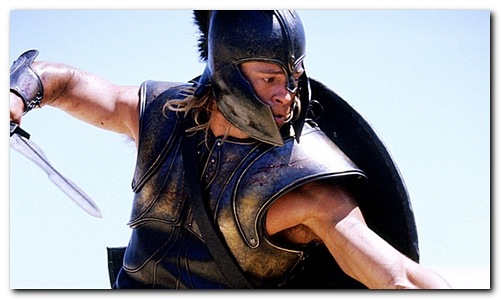 For those of us who’re not familiar with the legend, here’s my summary of it.
For those of us who’re not familiar with the legend, here’s my summary of it.
Paris, a young prince of Troy, is visited by three Goddess who poses to him a question: who’s the fairest of them all. Athena promises him wisdom, Hera promises him power and wealth, and Aphrodite promises him the most beautiful woman. Paris decides as men would: he chooses beauty above brains and power, and is given the opportunity to steal Helen, the queen of neighboring kingdom Sparta.
Unfortunately, when Helen was deciding who to marry earlier on, she elicited an agreement from her army of suitors: that all her suitors must swear to support whoever she chose. So, all the Greek princes were honor bound to rescue her back from the Trojans. And this they did under the leadership of Agamemnon – the brother of Helen’s husband Menelaus – who rallied the Greek armies and all their kings and princes. They set sail in a thousand ships across the Aegean sea to fight the Trojans and win back Helen. That incidentally is where the phrase “the face that launched a thousand ships” comes from.
The campaign to win Helen back was anything but short and easy. It involved all the Greek and Trojan heroes and heroines, including Achilles – who was regarded as the greatest Champion the Greeks had on their roster – Ajax, Menelaus the luckless husband, Odysseus the wily, Prince Hector (Achilles’ opposite in the Trojan camp), Cassandra the prophetess, and Aeneas. As the story goes, even the Gods – Zeus, Apollo, Hera, Athena, Aphrodite, Poseiden – got involved with many taking opposite sides in the war.
The war was to last ten years, and in the first nine years was largely on a stalemate with neither side gaining significant advantage for long. In the tenth year however, a series of incidents took place that precipitated the war towards a conclusion. Agamemnon in a moment of folly offends a priest of Apollo, who returns the favor by asking his God to inflict a murderous plague on the Greek armies. When Greek warriors die left right center, Agamemnon is publicly chided by Achilles. Angered at the slight, he punishes Achilles by taking his beloved concubine, Briseis.
Enraged, Achilles sits out the rest of the war in protest. This emboldens the Trojans and they start making big headway in pushing the Greeks back into the sea.
Pressured, Achilles reluctantly lets his best friend, Patrokles, don his armor and weapons to rally the dazed Greeks. This he does, but when he runs into Prince Hector on the field of battle, the two engage in a duel. Hector kills Patrokles, and enraged (again), Achilles returns to the battle seeking revenge.
In a climatic duel, Achilles kills Hector, then proceeds to disrespect the corpse. But he has a change of heart when Hector’s father, King Priam of Troy, makes a secret visit to personally beg for the return of his son’s body. But the Gods are not appeased, and shortly thereafter, Achilles is killed by a poison arrow that goes right through his only, vulnerable spot: in his heel, bringing about the classic phrase ‘Achilles’ heel’.
The war stretches on just a bit more until Odysseus hatches a scheme to pack all the Greek heroes into a wooden horse they’ll leave behind while the rest of their army pretend to sail away. The Trojans, tired of war, welcome their apparent victory and bring the wooden horse past their gates and celebrate. That night, with the Trojans all drunk into a stupor, the Greek heroes emerge, open the gates to their waiting army – and all proceed to kill, pillage, rape, burn and sack the whole city and its inhabitants.
The story didn’t actually end there though. The Gods were so angered by the Greek’s cruelty in their wanton destruction of Troy that they cursed the Greek heroes – with the result that many would never return home, others would die, while yet others would only return home after more tribulations. Homer’s other story, The Odyssey, basically tells one such story and of Odysseus’ return home.
Continued in the next post.:)
Recent comments